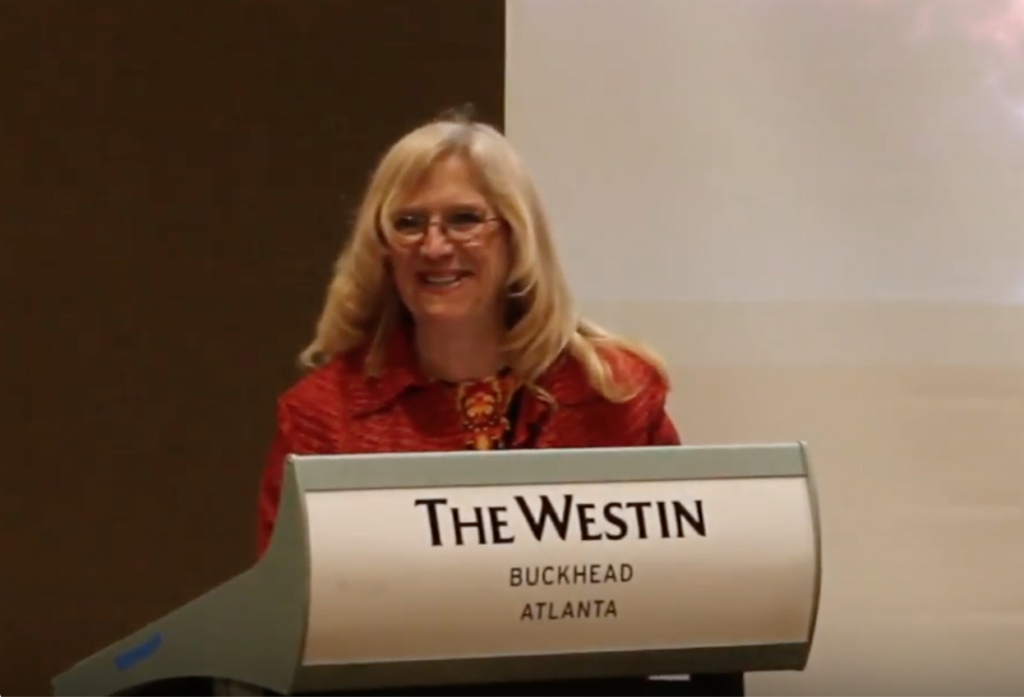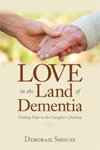Posts Tagged ‘Alzheimer’s Speaks’
What They Don’t tell You About Dementia: A Guest Post by Laurie Scherrer
Laurie Scherrer is a light in the universe. I met her on the radio, when she co-hosted the ground-breaking program Alzheimer’s Speaks, with Lori La Bey. I was instantly inspired by Laurie’s warmth, honesty, humor, and insights. Each time I talk to her, I have fun and I learn from her. Recently, I asked her, “How can I support you in the wonderful advocacy work you are doing?” Laurie answered, “You can repost this blog, What They Don’t Tell You about Dementia.”
Laurie’s post is not just inspiring: it could be life-changing for someone who is newly diagnosed with dementia. After reading it, you’ll want to subscribe to Laurie’s blog.
What They Don’t tell You About Dementia: by Laurie Scherrer, DementiaDaze.com
When I was diagnosed with dementia (Early On-Set Alzheimer’s and Frontotemporal Degeneration) the doctors told me and my husband:
- My working days were over
- I needed to “Get my affairs in order and see an attorney”
- The time would come when I wouldn’t recognize my loved ones
- For any additional information we should go to the Alzheimer’s Association Website
- I may experience “sun-downing” in the late afternoons
- Come back in six months to see how rapidly you have progressed
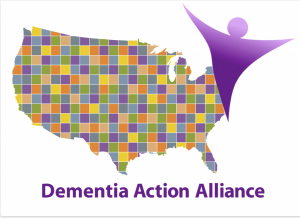 What the doctors SHOULD have told us:
What the doctors SHOULD have told us:
- There are many things that can aggravate or enhance the confusion and agitation that comes with dementia. With observation and patience, you may be able to recognize what triggers these symptoms. For example noise, stress, over-stimulation or lack of sleep. These triggers are not the same for everyone.
- Once you recognize the triggers you may be able to find ways to lessen their impact. For example, use earplugs when in a store or restaurant to reduce the noise, keep gatherings small to avoid over-stimulation, and when needed take an afternoon nap.
- The more independence you give up and allow other people to take care of – the more dependent you will become on others. Change your thought process from “I can’t do this anymore” to “How can I accomplish this task (what changes or modifications can we make to assist me).”
- On days when you are using a lot of cognitive reserve your symptoms may be strong (usually in the afternoon). This is your brain saying it is tired and needs a break. Try listening to some music or taking a nap.
- It is OK to take some time to grieve for your losses and accept that life will change. Most people need to experience this after diagnosis and again as their abilities change. In addition to grief, you may experience shock, anger, denial and sadness. These are normal reactions that can help you come to terms with your disease and hopefully help you to move on.
- Get involved with others with dementia as much as possible. There are a number of groups that offer video chats with other people living with dementia so you can socialize, ask questions and encourage each other. dementiamentors.org offers a mentor program so you can have weekly chats with someone living with dementia.
- Stay active and socialize with old friends and new. Once you curl up into yourself it is hard to get out. Enjoy life, friends, family and activities for as long as you can.
- Build your passion to fight back! Sometimes it is the passion within us that drives us to continue fighting. Get involved in advocacy work to educate about dementia. Contact Dementia Action Alliance at daanow.org to get started.
- You will have good moments when you feel “normal” and think you should go back to work and you will have bad moments when the world is a fog (dementia daze zone). You may feel confused and disoriented and find it difficult to think. There will be times when nothing seems to make sense and you can’t remember how to do things and then the fog will go away (at least for awhile). It’s OK to admit you are having a bad day.
- Dementia is more than memory loss. You may experience problems with your balance, lights flickering in your eyes, hallucinations, develop fears, or smell things that aren’t really there. Don’t be frightened, keep track of any changes or strange feelings to see how often they occur
- Dementia can progress fast, but in most cases it is a long slow progression. You may want to keep your affairs in order, but by implementing changes and strategies you will be able to overcome many obstacles and live a beneficial and happy life for some time.
Since I’m sure your doctor said about the same thing as mine, I hope you find this helpful. Now go enjoy life – Live, Love and figure out how to make adjustments to over come your obstacles.
My motto is: I don’t want just to survive – – I want to live and thrive!

Love & Laughter,
Laurie
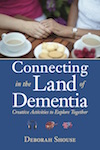
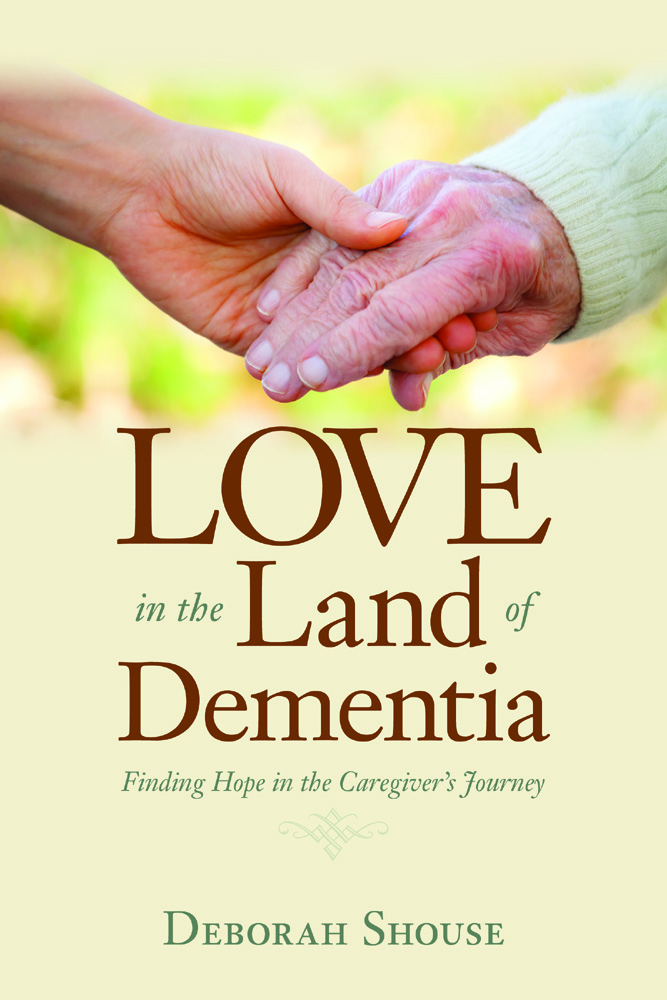
Widening the World Through Travel
As the waiter served dessert, Lori La Bey looked around the table at her family and smiled. She couldn’t believe she had pulled this off — her children, her siblings and their children, and her parents all enjoying a Caribbean cruise together. Her mother was living with Alzheimer’s and her father had brain cancer: they had assumed they wouldn’t get to travel again. They were beaming and Lori knew all her planning had been worth it. She was widening the world through travel.
She still treasures the family pictures from this trip. This meaningful travel experience inspired Lori, founder and host of Alzheimer’s Speaks, to orchestrate a cruise for people who are living with dementia and their families.
“Travel is a normal part of life,” Lori says. “When you stop traveling, your world becomes smaller.”
From her years caring for her mom, Lori understands how easy it is to feel isolated and stuck. She also understands the joy of engaging in the world, trying new things, and meeting new people. Her trip enriched her family and she wants to offer others that gift of connection and adventure.
Lori also learned some tips from traveling with her parents. Here are a few ideas for creating a smooth traveling experience for yourself and for someone who is living with dementia:
Create a flexible travel experience. Lori chose cruising because it can be reasonably priced, you can unpack once and stay in the same room the entire trip, and there’s lots of flexibility with eating (including free room service), activities, and touring. Cruising is also ideal for the intergenerational experience, offering activities for all ages.
Make the person living with dementia part of planning the trip. Discuss the trip with all involved, asking for feedback and talking about what each person really wants to do. Incorporate those dreams into the trip.
Empower your travelers. Lori packed all her parents things into one giant suitcase. Her father had always been the one managing the luggage and he really wanted something to carry. “I hadn’t thought to pack a couple of small bags so he and my mom could feel like regular travelers,” Lori says. “People want something to be in charge of so they don’t feel left out.”
Work with a travel agent and make your life easier. Plan in advance for noise, long transfers, layovers, long car rides, and other chaos. If flying, call the airport if you need to arrange for wheelchairs or other inner airport transportation. To mute noises, bring earplugs. Carry along items that soothe and comfort each of us, including favorite music and head phones. If you’re cruising, talk to the cruise lines in advance, discussing special needs, including dietary, medical, and any mobility issues.
Take pictures and videos and document these precious moments. You’ll enjoy looking through these memories again and again together.
“Travel is about being together and widening your world,” Lori says. “It’s a wonderful way to build those moments of magical and meaningful connection.”
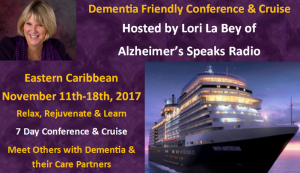
For an amazing way to widen your world, consider Lori’s upcoming November Dementia Friendly Conference and Cruise. Lori and a team of educators, including a panel of inspiring people who are living with dementia, have planned a nurturing, connecting, educational, and inspiring Caribbean trip. For more information, visit, https://alzheimersspeaks.com/cruise-with-us
Widening the World Through Travel
As the waiter served dessert, Lori La Bey looked around the table at her family and smiled. She couldn’t believe she had pulled this off — her children, her siblings and their children, and her parents all enjoying a Caribbean cruise together. Her mother was living with Alzheimer’s and her father had brain cancer: they had assumed they wouldn’t get to travel again. They were beaming and Lori knew all her planning had been worth it. She was widening the world through travel.
She still treasures the family pictures from this trip. This meaningful travel experience inspired Lori, founder and host of Alzheimer’s Speaks, to orchestrate a cruise for people who are living with dementia and their families.
“Travel is a normal part of life,” Lori says. “When you stop traveling, your world becomes smaller.”
From her years caring for her mom, Lori understands how easy it is to feel isolated and stuck. She also understands the joy of engaging in the world, trying new things, and meeting new people. Her trip enriched her family and she wants to offer others that gift of connection and adventure.
Lori also learned some tips from traveling with her parents. Here are a few ideas for creating a smooth traveling experience for yourself and for someone who is living with dementia:
Create a flexible travel experience. Lori chose cruising because it can be reasonably priced, you can unpack once and stay in the same room the entire trip, and there’s lots of flexibility with eating (including free room service), activities, and touring. Cruising is also ideal for the intergenerational experience, offering activities for all ages.
Make the person living with dementia part of planning the trip. Discuss the trip with all involved, asking for feedback and talking about what each person really wants to do. Incorporate those dreams into the trip.
Empower your travelers. Lori packed all her parents things into one giant suitcase. Her father had always been the one managing the luggage and he really wanted something to carry. “I hadn’t thought to pack a couple of small bags so he and my mom could feel like regular travelers,” Lori says. “People want something to be in charge of so they don’t feel left out.”
Work with a travel agent and make your life easier. Plan in advance for noise, long transfers, layovers, long car rides, and other chaos. If flying, call the airport if you need to arrange for wheelchairs or other inner airport transportation. To mute noises, bring earplugs. Carry along items that soothe and comfort each of us, including favorite music and head phones. If you’re cruising, talk to the cruise lines in advance, discussing special needs, including dietary, medical, and any mobility issues.
Take pictures and videos and document these precious moments. You’ll enjoy looking through these memories again and again together.
“Travel is about being together and widening your world,” Lori says. “It’s a wonderful way to build those moments of magical and meaningful connection.”
 For an amazing way to widen your world, consider Lori’s upcoming November Dementia Friendly Conference and Cruise. Lori and a team of educators, including a panel of inspiring people who are living with dementia, have planned a nurturing, connecting, educational, and inspiring Caribbean trip. For more information, visit, https://alzheimersspeaks.com/cruise-with-us
For an amazing way to widen your world, consider Lori’s upcoming November Dementia Friendly Conference and Cruise. Lori and a team of educators, including a panel of inspiring people who are living with dementia, have planned a nurturing, connecting, educational, and inspiring Caribbean trip. For more information, visit, https://alzheimersspeaks.com/cruise-with-us
Deborah Shouse is the author of Connecting in the Land of Dementia: Creative Activities to Explore Together and Love in the Land of Dementia: Finding Hope in the Caregiver’s Journey.
Inside Advocacy with Karen Love: Making a Difference for Those Living with Alzheimer’s
Alzheimer’s is a democratic disease and no one is immune. Movie stars, politicians, bankers, comedians, business moguls, professors, and homemakers– any one of us could face living with dementia. Karen Love is a founder of the Dementia Action Alliance, which focuses on improving dementia care for the more than five million Americans currently living with the condition. Karen works with governmental agencies to define and improve a person-centered standard of care for elders and for those living with dementia. She’s an inspiring leader and I wanted to share some of her insights with you.
Q and A
Q: What prompted you to form a non-profit and become an advocate for aging and for those living with dementia?
A: Advocacy must be in my DNA. Even as a girl, I was always sticking up for people and their rights. I initially worked as an administrator in assisted living and I became concerned about how fast the industry was growing without paying attention to the needs of its vulnerable residents, particularly those who had dementia. In 1996, I founded a non-profit organization, Consumer Consortium for Assisted Living (CCAL), to advocate for, support and educate consumers about assisted living. After a decade, we renamed the organization CCAL—Advancing Person-Centered Living, and we expanded our mission to encompass all elder care settings. We focused on promoting quality of life and person-centered practices.
Q: You’ve worked with Medicaid and Medicare to help define and implement a mind-set of person-centered care. What does person-centered care mean and why is it so important?
A: The World Health Organization and the Institute on Medicine recognize Person-Centered practices as the gold standard. Person-centered practices support people’s emotional, social, physical, and spiritual well being. They focus on treating people with dignity, fostering choice, independence, and feelings of purpose, value, and self-worth. These practices also help people maintain normalcy in their daily life. I’ve had the honor to help shape the person-centered framework for CMS’s home and community-based division, which support such state-based services as home care, adult day, and assisted living for individuals Medicaid eligible.
Q: You’ve now gathered thought leaders in the fields of aging and dementia, building a coalition of people dedicated to “making dementia better” in our country. What are some of your goals?
A: Our goals include:
- Enhance knowledge about dementia and person-centered care practices so people living with dementia are no longer stigmatized.
- Improve healthcare practitioners’ understanding and knowledge about dementia care, person-centered practices and treatment, and make sure materials are accessible.
- Share information with care partners and healthcare providers about the value of attending to emotional, social, and spiritual well being.
- Increase federal and state funding for dementia-care related support.
Q: What are some inspiring actions that ordinary caregivers or persons living with dementia have taken?
A: Just a couple of examples include:
- Michael Ellenbogen is a person who is living with dementia. Prior to being diagnosed, he was a high-level bank executive. He has become a tireless advocate and spokesperson for dementia.
- Lori La Bey started an online weekly radio program called “Alzheimer’s Speaks” to provide a venue for people to learn about dementia, share their experiences, and be supportive.
Q: What are three easy things each person can do to act as an advocate for those living with dementia?
A: Here are some suggestions:
- There are three ways things change nationally: (1) the President makes it happen (2) Congress makes it happen (3) the groundswell of people’s voices and actions make it happen. There has not been an interest for the first two methods. Historically, method 3 was effective for impacting and changing issues such as HIV/AIDS and breast cancer. The Dementia Action Alliance brings people together so we can be a catalyst for change.
- Words matter. Often people living with dementia, including Alzheimer’s, are called “patient,” “victim,” “demented,” and “sufferer” – and the condition is called a “dementing illness” and an “affliction.” This type of language can impact how people living with dementia feel about themselves and how they are treated by others. Print out “Use Words Wisely” from the website – www.daanow.org/words-matter/- and help educate others about what words to use.
- Email the Dementia Action Alliance at info@daanow.org about your interest in volunteering. Consider making a financial donation at www.daanow.org The more people involved in the Dementia Action Alliance, the sooner and greater the impact.
Please feel free to share this information with your friends and colleagues. The more we all work together, the more effective our voices will be.
Deborah Shouse is the author of Love in the Land of Dementia: Finding Hope in the Caregiver’s Journey.
